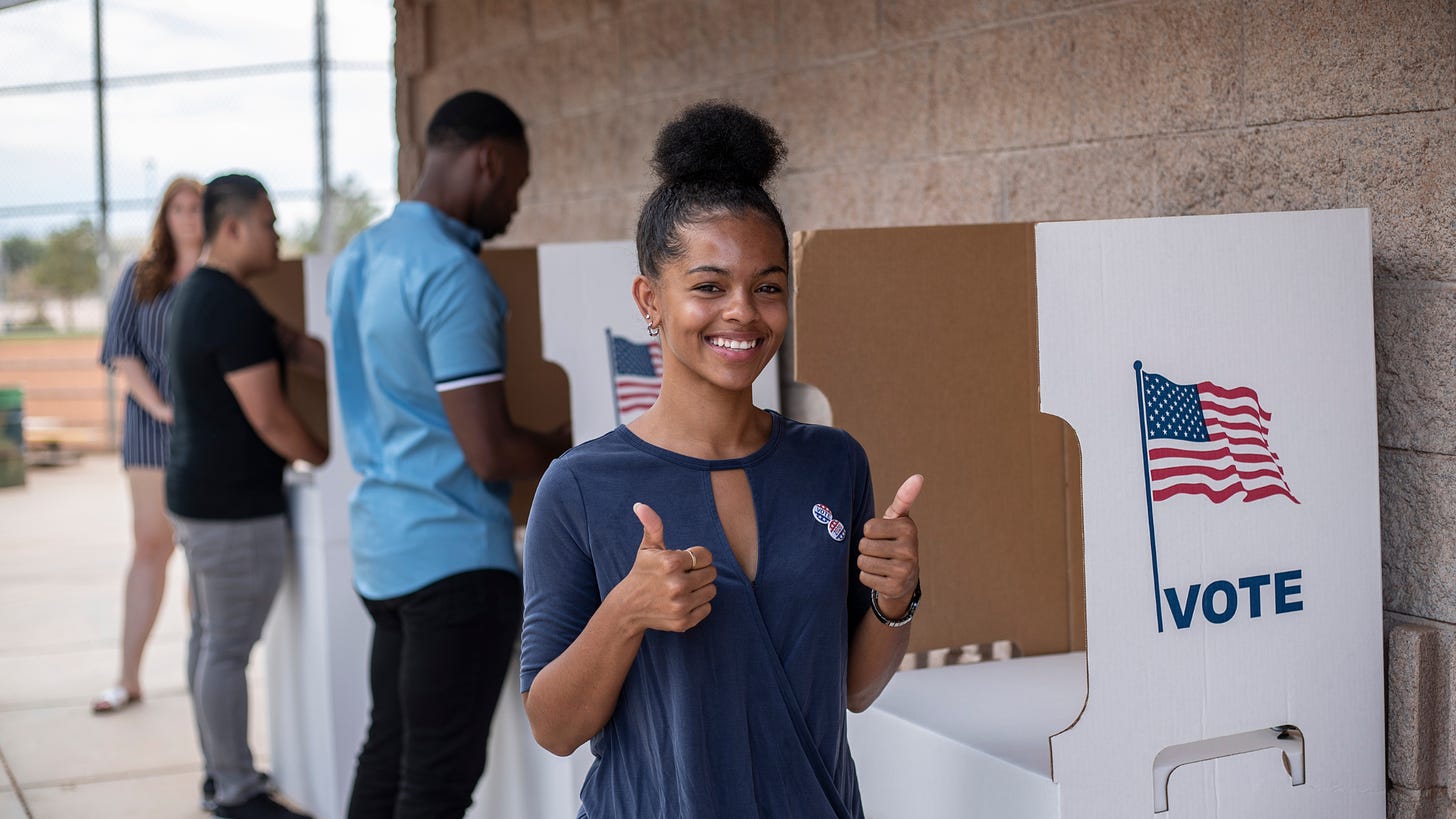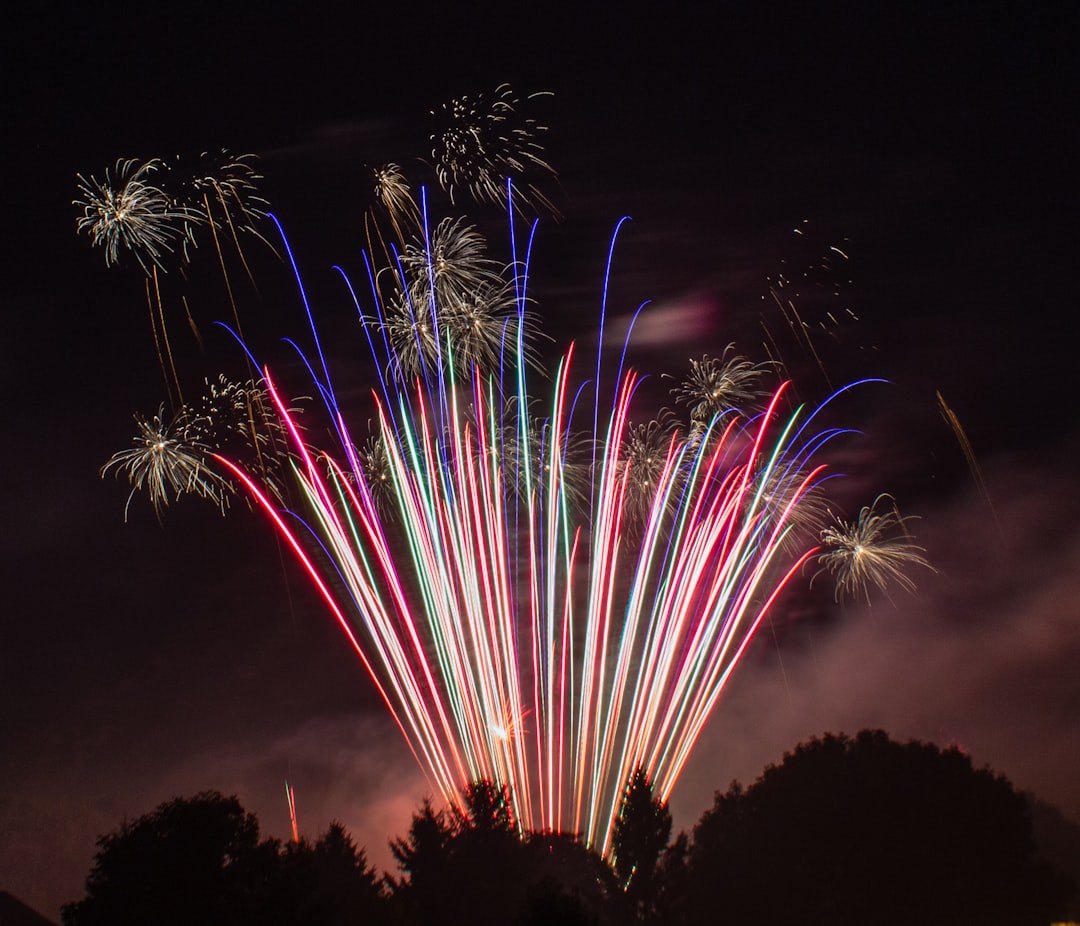Good Citizenship Goes Beyond Election Day
With a year to prepare for another election, let's make active citizenship a regular practice
I’ve always had an unusually high interest in politics. Even as a kid, I wanted to understand leadership and how they impacted my life. By the time I was in high school, my concerns about human rights around the world had convinced me that someday I wanted to adopt a little girl from China. (Note to reader: Age and experience have taught me that this desire is far more complicated than I realized when I was an idealistic teenager. We never looked into international adoption after we were married.)
So it shouldn’t have been a surprise to me when I decided to change my major in college from English and Speech/Drama to English and History: two subjects that would feed each other and make me a much better English teacher than I would have been otherwise. My love for literature helped guide my reading of history textbooks and helped me to better understand my country and world and the literature I would teach my students. My history professors encouraged curiosity and demonstrated the importance of seeing an issue from multiple angles.
But as a young adult who wanted to claim that I was politically independent, it would take me years of experience and reading and listening before I would break away from voting mostly straight ticket. And as a teacher, I worked hard to stay politically neutral in my classroom. I was determined to present my students with information and let them come to their own conclusions. When they wrote argument papers, I didn’t argue against their argument, just showed them the weaknesses in how they presented those arguments. Facts were still facts. Universal truths were still held to be truths.
Then 2016 happened. Suddenly the lessons I was teaching to my English students were being played out in real time on our political stage. Every time I didn’t think things could get worse, they did. The 2016 election was the first time I had ever publically begged people to not vote for someone. By 2020, I publically announced who I was voting for in an effort to stop my loved ones from once again picking a man who I knew was bad for our country. And then January 6 happened, and I knew that the hope I had felt for two months was going to have to take a backseat to the democracy we saw crumbling before our eyes.
But here’s the thing, I still have hope. I still believe in the promise of what America could be. I still believe that there are more who believe in democracy than those who don’t. History is not linear and our country’s history is no different.
So while I normally write personal reflections about the world around me, I’m doing something a little different. I want to offer suggestions for four actions that I believe we should encourage and nurture in ourselves and our fellow citizens as we enter yet another contentious presidential election year.
The Primaries Matter
This is something I wish I had realized when I was much younger and naive and something I plan to make sure my own children understand when they are eligible to vote.1 The primaries matter because that is what determines who is on the ballot during the general election. The uncomfortable truth is that the most dedicated and extreme voters tend to be primary voters and that means more extreme candidates. While we do need election reform related to primaries and candidate selection (Ranked Choice Voting would go a long way here) we have to work with the system we have. Vote in the primaries in which you feel like you can have the greatest impact and vote for the very best candidates.2 We want to give people something to vote for, not something to vote against.
Get Others to Register to Vote
The election of 2020 may have been a record-setting year for a presidential election, but a third of Americans (or 80 million people) still did not get out to vote. The importance of voting extends beyond just every four years when we select a president. There are elections in every state or jurisdiction several times between those major elections. Those elections have a much greater impact on our daily lives. Our city council members, school boards, mayors, and especially state legislatures, make decisions about our towns, schools, cities, and states. They have a far greater impact on our health and finances than what is happening in Washington, D.C. Getting our neighbors registered to vote is the first step to helping them realize the impact of a single vote in local elections.3
Stop Voting the Party Line
As someone who initially followed my conservative upbringing and started my life voting almost exclusively Republican, it took me a long time to learn this. And as a citizen who has watched what the GOP has done to our national politics and what they are doing in my state politics (both in Indiana and in my former state Texas), I struggle to encourage people to split their tickets. But here’s the reality: we are voting people for positions that require skills and experience and if personal politics don’t matter for the position, just pick the best person for the job. A functional government requires that we have serious people doing serious jobs. This is the message we need to keep passing along to our friends, family, and neighbors.
Stop Arguing With People Online
About a month before the 2022 election I took Facebook off of my phone. I didn’t want to lose contact with friends and family, so I still checked in on my desktop when I was at home, but suddenly not having notifications from the incendiary posts of loved ones helped my mental health in ways I didn’t predict. A long time ago I had decided to use the approach “Does this further the Kingdom?” when it came to my social media interactions, but I wasn’t always perfect, especially in the wake of January 6.
Here’s what I’ve learned: I can’t change peoples’ minds in a social media post. I’ve tried, and I’m pretty sure the people I’m trying to persuade have blocked me. Unfortunately, we’re all locked into our own echo chambers and I keep fighting my way out. But most would rather say where they are comfortable. In Ezra Klein’s book Why We’re Polarized, he points out study after study that shows that our biases can often blind us to oppositional facts, even if the facts are indisputable. Relationships and conversation change hearts and minds, not memes or short videos.4
Imagine the World You Want to Live In
What do you want for yourself, your kids, your neighbors, and your grandchildren? What kind of world do you want to leave behind? What do you want your legacy to be?
Yes, those are big questions, but they are the kind of questions I frequently ask myself as I look at the decisions we are making with our home, travel, and finances. Sometimes I’m uncomfortable with the answers when I look at the decisions that we are making on a daily basis, but we’re always trying to do better. There is no perfect course of action. Not every behavior change works for everyone. And even if we have the same end goal as our neighbor, we may make different decisions about the leadership we feel is best suited to get us to that common end goal. But it’s important to recognize that most of us have the same desires for ourselves and our families, so it is up to us to talk through our vision for how to get there.
Pick the changes you can make in your life and encourage others to try the same changes. Policy can change behavior, but changed behavior can also change attitudes about policy. In Katharine Hayhoe’s book Saving Us, she writes about instances where people who had argued for years against the realities of climate change had their position changed when they decided to pursue green technologies such as solar power and windmills. Because they discovered the value of changing their personal habits and discovered the value in doing so, they eventually embraced ideas that they had opposed for years. And when people see us making changes and benefiting from them, they will consider changes in their own lives, which may unintentionally shift their politics.
We aren’t going to change things overnight. We can’t look at a single election and believe that we’ve turned the tide or that all hope is lost. But I can’t stop believing that most of us want to see our country and all of her citizens flourish. We just need more of us working to ensure that happens.
Our Job As Citizens Doesn't End In the Voting Booth
Organizations that can help you move forward
If, like me, you consider yourself a politically homeless person of faith, I have found these sources as good places to start for finding a path forward with friends and family all over the political spectrum.
Support my writing
While most of my work here is free for all subscribers, it is still a labor of love that I fit into the few hours I have when I am not teaching or being an attentive wife and mom. If you would like to support my writing but you do not want to commit to being a paid subscriber, please consider one-time donation.
You can also support me by ordering my book or books from my favorite book lists at my Bookshop.org affiliate page.
If you want to be a regular supporter, you can upgrade your subscription from free to paid and get occasional content only for paid subscribers.
And thank you for supporting my journey 💗
If I had known how much, I would have voted in the 2000 primary and voted for John McCain.
Playing games with the primaries can be dangerous. Resist the urge to vote for extremist candidates in an effort to give your favorite candidate an edge in the general election. Our fellow citizens, and life in general, are unpredictable: https://www.pbs.org/newshour/show/democratic-groups-spend-money-on-republican-primaries-to-nominate-less-appealing-opponents
Of course, now would be the time for me to admit that I did not vote in our 2023 local elections because I discovered that living outside of the town limits disqualifies us from voting for town council. And yes, I did drive to the library and had them scan my driver’s license to verify that I had no races to vote for in our county.
Plus, there is something to be said for not wanting to feed the algorithm beast. Don’t give oxygen to people who should not be the loudest voice in the room.






Democracy thrives when individuals are engaged, informed, and open to dialogue. These principles can make the world a better place, and your message is one of hope and empowerment during these challenging times. Thank you for sharing your insights and your vision for a brighter future for all.
👏👏👏 I especially applaud “stop arguing with people online”--you are correct, it only leads to polarization. People read posts for validation and hardening of their existing views. I feel the best way to engage in discourse is face to face through community gatherings. Thank you so much for this post.